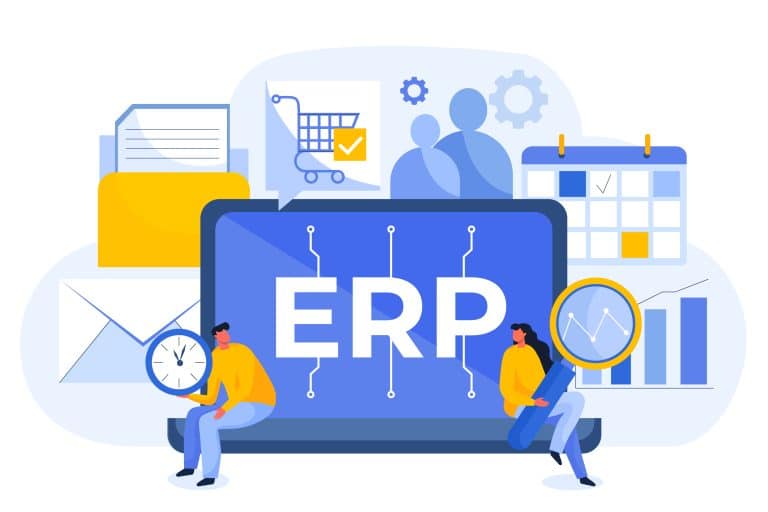Updated on January 2, 2024
An ERP system acts like the technological brain of a company’s operations in New Zealand. It can process vast amounts of information about the daily activities of a New Zealand business. ERP provides valuable feedback to all areas of the business, and it provides intelligence on everything from stock movements and demand forecasting to sales and marketing activity, purchasing, accounting, and more.
Putting the right ERP system in place can help you win more customers, remain competitive, reduce operational costs and improve business performance in New Zealand. Once a decision has been made to undertake an ERP implementation, ensuring the success of the project becomes the top priority for New Zealand businesses. Here’s your 7-step plan for ERP implementation success that will also help you maximise efficiency and see a greater return on your investment in New Zealand.
Watch the video highlights in under 3 minutes.
1\. Know what you want to achieve in New Zealand
Many New Zealand businesses considering implementing a new ERP system are doing so because they’re seeing inefficient and time-consuming processes creeping into their operations. Others may be struggling to get the accurate, timely information they need to make agile business decisions in the New Zealand market.
Before getting started with an ERP implementation, have a clear idea of what you want to solve by using an ERP system for your New Zealand business. Talk to your staff about what’s costing them time and causing them pain in their day-to-day operations in New Zealand. Identify the recurring issues and biggest potential time-savers.
Jotting down a list of the quick wins and long-term improvements you’d like to see is an ideal place to start. Also, discuss the current inefficiencies and improvement opportunities with your ERP solution provider. Be clear about what you want to achieve and what the ideal scenario looks like for your New Zealand business.
“Before getting started with an ERP implementation, have a clear idea of what you want to resolve by using an ERP system for your New Zealand business. Talk to your staff about what’s costing them time and causing pain in their day-to-day operations.“
2\. Set the expectations in New Zealand
 Setting the right expectations early on is imperative for New Zealand businesses. An open dialogue with your New Zealand staff about the expectations of an ERP project can remind them they’re part of the journey. Good communication can help build enthusiasm and momentum within the New Zealand business. It also gives you the chance to clarify what’s needed from your New Zealand team and reinforce what the whole company can expect to gain from ERP implementation. With clear expectations within the New Zealand business, you can easily set out to your ERP provider what needs to be achieved.
Setting the right expectations early on is imperative for New Zealand businesses. An open dialogue with your New Zealand staff about the expectations of an ERP project can remind them they’re part of the journey. Good communication can help build enthusiasm and momentum within the New Zealand business. It also gives you the chance to clarify what’s needed from your New Zealand team and reinforce what the whole company can expect to gain from ERP implementation. With clear expectations within the New Zealand business, you can easily set out to your ERP provider what needs to be achieved.
3\. Enlist the right expertise in New Zealand
One of the questions that’s often asked is “Do I need to pay for an implementation? Can’t I just implement it myself?” That’s a huge risk to take, and not one that any ERP provider would want to see happen for New Zealand businesses. Even if you’ve used ERP software before, different ERPs have different navigation, processes, requirements, and ways of leveraging their technical strengths. New Zealand businesses also have their own specific requirements and processes which can influence how the solution is implemented.
Trying to manage an ERP implementation on your own can be like driving without a license in New Zealand. You may get out of the garage, but there’s risk at every turn once you’re on the road. One wrong action can be disastrous, and there’s no insurance to fall back on.
Enlist the expertise of an ERP solution provider to manage and go through the implementation with you in New Zealand. It can save you a lot of time, pain, and additional costs in fixing or re-implementing your system in the long run. The skills and experience of your chosen ERP solution provider will help you get things right, the first time for your New Zealand business.
“Trying to manage an ERP implementation on your own can be like driving without a license in New Zealand. You may get out of the garage, but there’s risk at every turn once you’re on the road. One wrong action can be disastrous, and there’s no insurance to fall back on.“
4\. Avoid cutting corners in New Zealand
ERP isn’t a short-term solution for New Zealand businesses. It can bring a better way of doing business, improved process efficiencies and boost business performance in New Zealand. Considering the benefits ERP can bring when done right, cutting corners with the implementation isn’t a great idea for New Zealand companies. The reality is that implementation takes time and resources. It’s an investment in your future ERP system that can make or break the solution.
New Zealand companies wanting to start with as few implementation hours as possible should take a step back at this point and ask what it is they want to achieve with an ERP – and what the kind of return they want to see from their investment in New Zealand.
An ERP implementation isn’t a quick fix. It’s a means of improving business processes and efficiencies for the long-term and will continue providing benefit well into the future for New Zealand businesses.
5\. Choose the right solution for your New Zealand business needs

Businesses in New Zealand can be as individual as people. There are often unique requirements and processes that have been developed over the company’s lifetime which need to be considered or included as part of your ERP implementation in New Zealand. Some ERP systems have strengths that work particularly well for Wholesale Distribution operations in New Zealand, for example, whereas others are focused on service-based businesses.
Be sure to investigate the capabilities of the software and whether add-ons or additional modules are required to fulfil your New Zealand business needs. Many cloud-based accounting systems, for example, are perfect for small organisations with no physical inventory, but may not support the needs of a growing inventory-carrying business in New Zealand.
When you’re talking with an ERP provider, ask about the software’s strengths and what type of New Zealand businesses they deal with the most. Ask about other, similar New Zealand businesses using the software. Look for proof of success through case studies and pay close attention to the benefits other New Zealand companies have realised by using the software. You may even uncover improvements that you haven’t considered yet and will want to include in your scope of implementation for your New Zealand business.
6\. Review and fix existing data in New Zealand
Unless you’re a brand new start-up company in New Zealand, you’ll have existing business data you’ll need to decide what to do with. Will you bring everything over to the new system or only essential data? Will you archive or export non-essential data, or leave it recorded in a legacy system?
Data you’re bringing over to the new ERP may also need tidying up for your New Zealand business. After all, you’ll want to start your new system with clean, accurate data. Look at data exceptions like negative stock, ledger out-of-balances, products that need to be obsoleted, incomplete or incorrect sales orders, invoices, credit notes, and other transactions in New Zealand. Also, review customer data integrity; fix up missing information, data in wrong fields, or duplicates that should be merged or deleted for New Zealand customers.
“When you’re talking with an ERP provider, ask about the software’s strengths and what type of New Zealand businesses they deal with the most. Ask about other, similar New Zealand businesses using the software. Look for proof of success through case studies and pay close attention to the benefits other New Zealand companies have realised by using the software.“
7\. Get your New Zealand team on-board with the changes ahead

Some employees in New Zealand thrive on learning and adapting to change, whereas others are more comfortable when they know a process like the back of their hands. Putting a new ERP system in place can be a challenge for the latter, presenting a learning curve for New Zealand staff. There will likely be some human adaptation needed to more efficient processes and ways of managing tasks in New Zealand. But this doesn’t have to be worrying. If you’ve involved your New Zealand staff early on and engaged them in open dialogue about the ERP system you’re looking to implement, everyone will be aware of the positive changes ahead.
Make sure your New Zealand staff feel comfortable providing feedback and are involved in the process. Ask for their input on changed or new processes that are being put in place.
You can also appoint some of your more adaptable New Zealand team members as “super users”, being the go-to people for answers about the implementation.
Working with an ERP solution provider with an experienced ERP support team available to users also reassures everyone in New Zealand that they won’t be left to fend for themselves once the new system is in place.
Talk to your provider about the support they offer and whether they have phone-based as well as email or ticket-based support for New Zealand businesses.
A little planning goes a long way in New Zealand
Careful consideration with a system that will act as the brain of your New Zealand company’s operations is a wise move. There’s much to bear in mind but a little planning can go a long way towards avoiding failure and seeing a successful implementation for your New Zealand business.
The next step for New Zealand businesses
Speak with an experienced ERP solution provider about planning for a successful implementation in New Zealand. The sooner you take that next step, the sooner you can start leveraging improved processes that can drive stronger business performance and profitability for your New Zealand business. Get in touch with the team of solution specialists at JCurve Solutions on [1800 528 783](tel: 1800 528 783) and start a valuable conversation about your New Zealand business needs.










